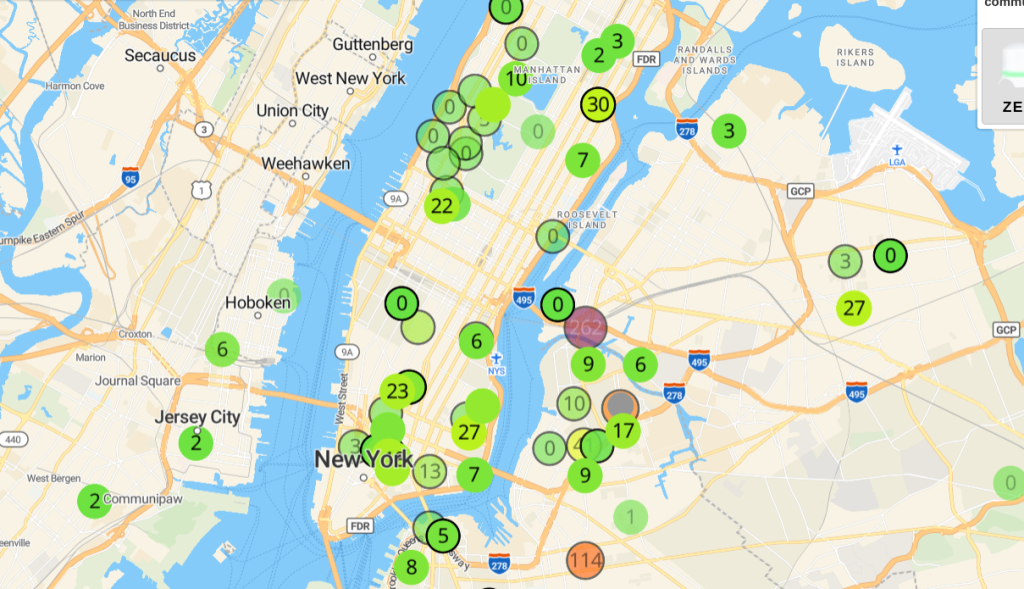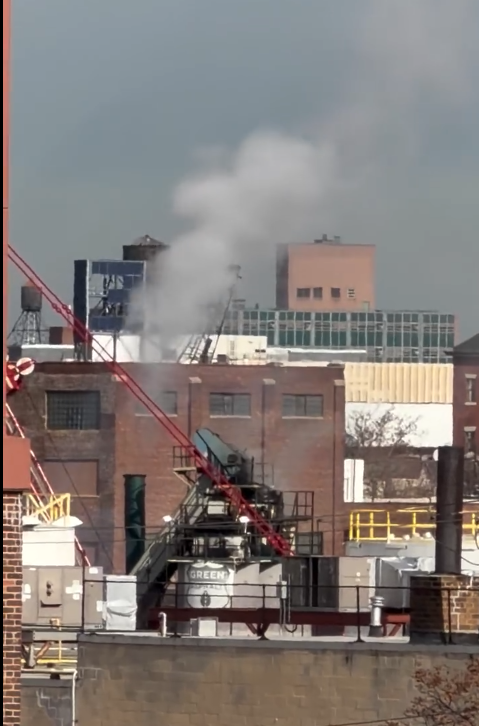After years of polluting Greenpoint, a plant billed as climate-friendly is closing temporarily for safety modifications. What took so long?
By COLE SINANIAN
Green Asphalt, an asphalt recycling plant in Long Island City that’s caused noxious air pollution in Greenpoint and Blissville for years, will likely cease operations on December 11 until it completes an extension of its smokestack.
Green Asphalt CEO Michael Capasso committed to closing the facility in a phone call with state regulators and local elected officials earlier this month. The news came after the New York Department of Environmental Conservation (DEC) had fined the company $124,000 for years of spewing foul-smelling fumes from its low smokestack into the surrounding neighborhoods, and for failing to submit emissions monitoring reports between 2019 and 2023. State regulators say doubling the smokestack from its current 45ft to 90ft will help reduce pollution at street level.
“Raising the stack height will improve dispersion of air emissions that historically have contributed to odor complaints in the surrounding community and will ensure that emissions meet stringent environmental standards,” wrote DEC communications specialist Adanna Roberts in an email statement.
A real headache
According to City councilmember Lincoln Restler, the company has yet to submit construction plans to the Department of Buildings. In a series of text messages, Capasso confirmed that construction of the smokestack had yet to start as of November 16, and it is unlikely that the smokestack would be complete by the December 11 deadline.
“It hasn’t started and it doesn’t look like it will be ready to be raised by Dec 11,” Capasso wrote. “Unfortunately there will be numerous employees laid off and will be out of work.”
But to Greenpoint and Blissville residents, who’ve submitted hundreds of complaints to the DEC and repeatedly called Green Asphalt to no avail, the news is a welcome development after years of tar smell choking their streets and wafting through their windows.
“It smells like burning tires,” says Thomas Mituzas, a lifelong Blissville resident with deep family roots in the neighborhood. “When you’re outside, it gets in your throat, your eyes, you taste it on your tongue, on the back of your throat.”
Mituzas lives with his 96-year-old great aunt in a house that’s belonged to his family since 1907. Blissville and neighboring Greenpoint are industrial areas full of heavy industry, so Mituzas is no stranger to weird smells in his neighborhood.
But since Green Asphalt first opened in 2011 at 37-98 Railroad Ave, he says the smell coming from the plant has gotten worse. When the wind blows in the right direction the clouds wafting from the low smokestack cause poor air quality and health issues at street level, Mituzas said.
It has a particular effect on his elderly aunt, who likes to enjoy her time outdoors.
“She has to sit down,” Mituzas said. “She’s 96. She’s a very active woman so she likes to go outside. And if the wind is blowing the right way, she can’t go outside. She can’t breathe.”
Jens Rasmussen lives less than a mile from the plant with his wife and toddler, on the other side of Newtown Creek. A 30-year Greenpointer, Rasmussen said the smell is especially bad over the summer, and that while there are numerous air quality issues in Greenpoint, Green Asphalt’s contribution is particularly egregious.
“It’s overpowering, like someone is pouring asphalt in your house,” Rasmussen said.
Between Green Asphalt and DKN Ready Mix, a nearby concrete supplier that’s also made the news for its pollution, Rasmussen says the air quality in Greenpoint is among the worst it’s been since he’s lived in the neighborhood.
“These companies are not good neighbors,” he said. “They’re happy to externalize their pollution and their costs to the community instead of taking reasonable and appropriate actions to make their facilities safe for the people nearby.”
Green Asphalt’s official operating hours are 6am-2:30pm, but neighbors say the plant will often operate in the evenings as well. The evening of Wednesday, October 29, Mituzas, said, was particularly bad. A website built to track Greenpoint air quality complaints submitted to the DEC shows an enormous spike on October 29, with a total of 110 complaints submitted in a single day, 60 of which were first-time reporters.
In meetings with residents and elected officials, Green Asphalt management has denied that the plant is the source of the smell. But residents say it’s obvious, as its emissions are perfectly visible. An Instagram page called shut_down_green_asphalt_lic documents the plant’s fumes almost daily.

Online air quality monitor purpleair.com shows Greenpoint as having some of the worst air quality in the city.
Recycled Pavement
The Green Asphalt plant in LIC has been operational since 2011, and was originally built to produce 100% reclaimed asphalt pavement, or RAP, a kind of paving substance composed only of recycled materials. According to Green Asphalt, the plant is the first of its kind in the country.
Since its opening, Green Asphalt has worked closely with City and State agencies to help maintain roads and ensure sustainability goals are met. In 2013, the company was awarded a pothole repair contract by the NYC Department of Transportation (DOT), filling potholes throughout the five boroughs with its recycled asphalt. Later that year, the company participated in a DOT pilot project testing the efficacy of fully recycled asphalt in paving roadways. The DOT owns and operates two asphalt plants— one on Northern Boulevard in Queens, and another on Hamilton Avenue in South Brooklyn. Combined, these city-owned plants produce 75% of the asphalt used by the City. The rest of the City’s asphalt is supplied by a handful of private producers, like Green Asphalt.
Green Asphalt has played a major role in the City’s road maintenance and sustainability operations. Per its website, the company has provided two million tons of recycled asphalt to the New York City Metro, producing approximately 100,000 tons of asphalt per year and turning a $10 million annual profit.
“We’re just looking for an opportunity to provide that benefit to the City of New York while reducing carbon footprint emissions all at the same time,” CEO and owner Michael Capasso at a January 2025 meeting of the City Council’s Committee on Transportation and Infrastructure.
Capasso is well-connected at both the local and national level. In 2022 , he was appointed to Mayor Eric Adams’ Capital Process Reform Task Force. And this past summer, he was appointed to the US Department of Transportation’s 12-member Advisory Board by Transportation Secretary Sean P. Duffy.
Five years too late
Despite the enormous volume of complaints submitted to the DEC, it took years for state regulators to pursue enforcement against Green Asphalt, filing a consent order only after State assemblymember Emily Gallagher’s office collected and submitted her constituents’ complaints to the DEC. Gallagher organized a town hall about the Green Asphalt plant at Greenpoint’s Polish Slavic Center on September 16, the same day that the DEC issued its consent order. Along with Gallagher and Capasso, DEC reps attended the meeting, as well as councilmember Restler and State Senator Kristen Gonzalez, in addition to 150 members of the public.
Mituzas, who also attended the town hall, said Capasso personally called him the night before the meeting in an attempt to assuage his concerns about the company’s activity. Mituzas, having previously spent years sending emails and calling Green Asphalt to no response, was unimpressed.
“What I said to him was, ‘you’re about five years too late, my friend,’” Mituzas said.
According to Restler, the company had previously committed to extending its smokestack earlier this year.
“They have been telling us for the better part of a year that they were going to imminently submit plans to the Department of Buildings to double the height of the smokestack and address this issue,” Restler said. “I’ll believe it when it happens, and not a moment before.”
Once plans have been submitted to the Department of Buildings, Restler said, construction on the smokestack should take only a few weeks. But in an email statement to the Star, Green Asphalt Chief Marketing Officer Kerianne Melillo called the smokestack extension a “complicated construction endeavor.”
“We are working with engineers to finalize a design that complies with local statues and achieves the desired result,” Melillo wrote.
Once the smokestack is complete, Green Asphalt must begin to submit DEC-approved emissions testing to ensure no toxic contaminants are released into the community. In her email statement, Roberts clarified that a complete assessment of the facility and the health threats it may pose to the community will be conducted after the new stack is complete.
“By collecting measurements from the stack and locations of potential fugitive releases, DEC will gain a more complete picture of the operations at the facility to address the community’s concerns,” she wrote.
Roberts added that Green Asphalt conducted an odor-sampling assessment in 2024 and found “reduced sulfur compounds,” which are known for their smell, and that a more rigorous assessment was needed and would be conducted in January 2026.
In his text messages to the Star, Capasso insisted that his company had already submitted test results to elected officials. But according to Restler, the data that Capasso provided via email was unsatisfactory.
“I don’t put a ton of faith in that dataset,” Restler said. “It was conducted by ownership without any independent health experts advising on the methodology and rigor.”
Restler said his office is currently working with the Newtown Creek Alliance, a local environmental group, and an NYU professor to conduct an independent test of Green Asphalt’s emissions in the coming weeks.
“The most important thing at this stage in the process is that Green Asphalt is shutting down in less than four weeks,” Restler said. “And I am optimistic that their fix will address the issues that have caused such concern in our community.”



